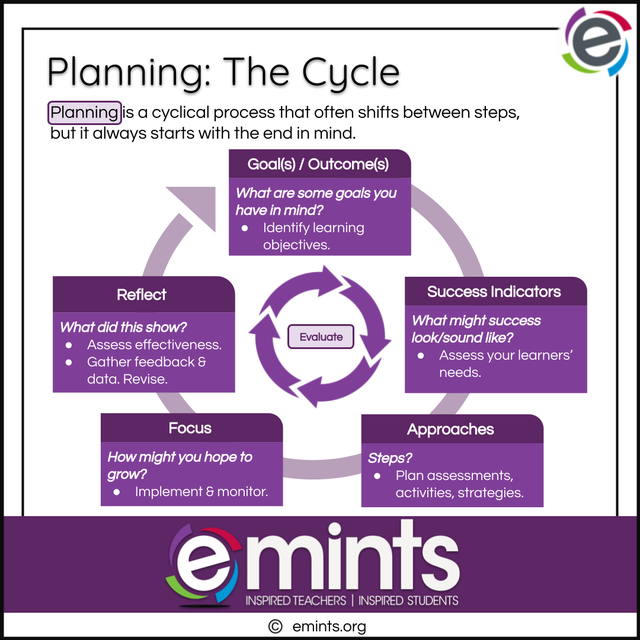- Facilitation Strategies
- >
- Tip: Planning > The Cycle
Tip: Planning > The Cycle
SKU:
What better time to plan than after you’ve reflected? Use that reflection process to help you plan efficiently and effectively for the upcoming school year.
Planning is a cyclical process that often shifts between steps, but it always starts with the end in mind.
- Goals - Start by clearly defining the desired outcomes. These objectives specify what learners should know, understand, or be able to do at the end of the instructional unit. Planning with the end in mind helps maintain consistency throughout the instructional planning process.
Ask: What are some goals I have in mind?
- Success - Understand the learners' current knowledge, skills, and interests. Determine what successful learning looks like using examples, rubrics, baseline scores, etc. at the end of the instruction
Ask: What might success look/sound like?
- Approaches - Now, it’s time to plan your learning. Create assessments (summative, then formative). Then, determine instructional strategies you will use throughout the process.
Ask: What might be the steps to get to the intended outcome?
- Focus - Implement your instruction with your focus in mind. Monitor the goals and focus throughout the process. Consider the diverse needs of the learners and plan for differentiation and accommodations.
Ask: How might I hope to grow? How might I hope my learners grow?
- Reflect - Assess the effectiveness of the instructional plan and make necessary revisions for improvement. Collect feedback from learners, analyze assessment results, reflect on teaching strategies, and update the plan accordingly.
Ask: What did this show?
And lastly, don’t forget to evaluate every step of the way. If something isn’t working, change it! That’s the beauty of this planning process: it often shifts between steps.
Inspired by Cognitive Coaching ®
View/Download the Planning > The Cycle Tip Card.



